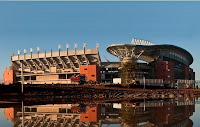The year 2010 can easily be phrased as ‘the year of celebration’ for South Africa for being the first African country to win the right to host FIFA World Cup 2010. Taking the grandeur and celebration of FIFA World Cup into account, great arrangements were made in order to provide the football fans and players with a memorable time during their visit to South Africa. The most essential part of all was to allow the players to do their best in the pitches. Consequently, the existing 5 stadiums of the country were largely upgraded and five new were built. Two of these are in Johannesburg while the rest 8 are in the other 8 host cities.

Soccer City Stadium:
Originally the site of Johannesburg’s FNB Stadium, Soccer City now stands tall becoming one of the world’s finest football stadiums and the largest of the African continent. Soccer City has been designed with great aesthetics to look like the traditional African ‘Calabsh’. It looks simply spectacular when lit up at night.
 Ellis Park Stadium:
Ellis Park Stadium:
Ellis Park Stadium was first built in 1928 and demolished in 1982 to see a face uplift. The stadium has been host to many important sports events like the 1995 Rugby World Cup final and 2009 Federations Cup between Brazil and the USA. Having seen up-gradation, the stadium now boasts world class amenities, seating arrangements and pitch.
Green Point Stadium:
Set in the City Bowl of Cape Town, Green Point stadium boasts a highly artistic design yet its pitch is perfect for footballers to dribble the ball whatever the way they like. Equipped with all possible modern amenities and a seating arrangement for 64000 spectators, Green Point Stadium will be hosting semi-finals for FIFA World Cup 2010.
 Mabhida Stadium:
Mabhida Stadium:
Mabhinda Stadium of Durban is one of the newly built stadiums. It is a multi functional arena and has a mind blowing structure. Overlooking the ocean and set with an arc that works as a cableway, Mabhinda Stadium is unique in magnificence and elegance.
 Loftus Versfeld Stadium:
Loftus Versfeld Stadium:
Situated in Pretoria, the Executive Capital of South Africa, Loftus Versfeld is the oldest stadium in the country. It site was first set in 1903 to host sports events and received a concrete structure in 1923, being the first concrete structured stadium in South Africa. Loftus Versfeld has undergone a number of changes and upgrades and now, it is all set to charm the FIFA World Cup 2010 matches.
 Nelson Mandela Bay Stadium:
Nelson Mandela Bay Stadium:
It was the craze of the people of Port Elizabeth for football that led South African to consider it as host city. Subsequently, Nelson Mandela Bay Stadium was built in the city, dedicated merely to football. The stadium boasts a futuristic architecture and state-of-the-art emenities.
 Free State Stadium:
Free State Stadium:
This stadium is located in the city of football’s most enthusiastic fans, Bloemfontein. For many years, it has hosted eminent sports events like those of rugby and football. The stadium has seen much refurbishment for FIFA and is fully prepared to host world class football matches.
Royal Bafokeng Stadium:
Royal Bafokeng Sports Palace has long been hosting football matches. In 2010, the stadium set below the clear skies of Rustenburg, has been designated many FIFA matches.
 Mbombela Stadium:
Mbombela Stadium:
Along with bringing FIFA to the city of Nelspruit, Mbombela Stadium stands as a pride for the residents of the city for its world class status. It is located in close proximity to the airport, nature reserves and city center.
Peter Mokaba Stadium:
Named after a popular anti-apartheid leader, Peter Mokaba Stadium is situated in Polokwane, the home town of the great leader. Its design has been inspired from that of the Baobab Tree and it has been built near the old stadium with the same name. As usual, it has been equipped with world class amenities.
With such stadiums in the country, South Africa is sure to provide football teams as well as their supporters, all what they could only dream of until now. As a part of the arrangements,
flights to South Africa were made largely available so as to keep, those who wish to fly to the country, from any problems.

 Ellis Park Stadium:
Ellis Park Stadium:
 Loftus Versfeld Stadium:
Loftus Versfeld Stadium: Nelson Mandela Bay Stadium:
Nelson Mandela Bay Stadium:




















